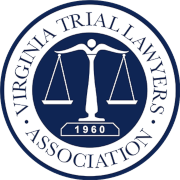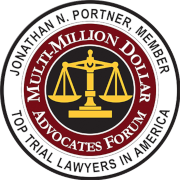Washington, D.C., Virginia & Maryland Theft Defense Lawyers
Thorough Defense Solutions for a Variety of Theft Crimes
At Portner & Shure, our experienced criminal defense lawyers believe that everyone deserves a thorough and vigorous defense. Being accused of a crime can have serious consequences to your well-being, from damage to your reputation to criminal conviction. That’s why it’s important to have experienced attorneys to help you understand your rights.
If you've been arrested for theft in the Maryland or Virginia areas, contact the experienced lawyers at Portner & Shure today at (410) 995-1515 for your free consultation.
In Maryland, robbery is the taking and carrying away of the personal property of another, from his person or in his presence, by violence or putting in fear of violence. Robbery is a felony, and if found guilty, penalties include up to 15 years imprisonment.
Armed Robbery
Armed robbery is robbery committed with a dangerous weapon or the threat of use of a weapon to commit robbery. A dangerous weapon includes a knife or a firearm. Armed robbery is a felony, and if found guilty, penalties include up to 20 years imprisonment.
Maryland General Theft Offenses
Section 7-104 of Maryland’s Criminal Law Article replaced the Common-Law crimes of larceny, larceny by trick, embezzlement, false pretenses, shoplifting, and receiving stolen property.
The General Theft Offenses codified are as follows:
-
Unauthorized Control Over Property: A person may not willfully or knowingly
obtain or exert unauthorized control over property, if the person:
- Intends to deprive the owner of the property
- Willfully or knowingly uses, conceals, or abandons the property in a manner that deprives the owner of the property
- Uses, conceals, or abandons the property knowing the use, concealment, or abandonment probably will deprive the owner of the property
-
Unauthorized Control Over Property by Deception: A person may not obtain
control over property by willfully or knowingly using deception, if the person:
- Intends to deprive the owner of the property
- Willfully or knowingly uses, conceals, or abandons the property in a manner that deprives the owner of the property
- Uses, conceals, or abandons the property knowing the use, concealment, or abandonment probably will deprive the owner of the property
- Possessing Stolen Personal Property: A person may not possess stolen personal property knowing that it has been stolen, or believing that it probably has been stolen.
Maryland Embezzlement
Embezzlement occurs when a person, who has legal access to, but not legal ownership of an asset, and misappropriates the asset for their personal use. Embezzlement is often viewed by the courts as one of the worst theft crimes because it involves a trusted person taking advantage of that trust and stealing for their own personal gain. Someone that is entrusted to manage money or property of another or of a company can be charged with embezzlement if they steal from that person or company for personal gain.
The statutory language is as follows: A fiduciary, or person in a trusted position, may not:
- Fraudulently and willfully appropriate money or a thing of value that the fiduciary holds in a fiduciary capacity contrary to the requirements of the fiduciary’s trust responsibility
- Secrete money or a thing of value that the fiduciary holds in a fiduciary capacity with a fraudulent intent to use the money or thing of value contrary to the requirements of the fiduciary’s trust responsibility.
A conviction for embezzlement will result in being found guilty of a misdemeanor and can result in imprisonment for at least one year, but not more than five years.
Maryland Theft Penalties
Theft penalties are broken down based on the value of the goods stolen. The higher the value, the more severe the penalty will be.
A person convicted of theft of property or services with a value of:
- Less than $100 will be found guilty of a misdemeanor and can face up to 90 days imprisonment or up to a $500 fine, or both, and must restore the property taken to the owner or pay the owner the value of the property or services
- Less than $1,000 will be found guilty of misdemeanor and can face up to 18 months imprisonment or up to a $500 fine, or both, and must restore the property taken to the owner or pay the owner the value of the property or services
- At least $1,000 but less than $10,000 will be found guilty of a felony and can face up to 10 years imprisonment or up to a $10,000 fine, or both, and must restore the property taken to the owner or pay the owner the value of the property or services
- At least $10,000 but less than $100,000 will be found guilty of a felony and can face up to 15 years imprisonment or up to a $15,000 fine, or both, and must restore the property taken to the owner or pay the owner the value of the property or services
- $100,000 or more will be found guilty of a felony and can face up to 30 years imprisonment or up to a $25,000 fine, or both, and must restore the property taken to the owner or pay the owner the value of the property or services
Maryland Theft Defenses (Section 7-110)
If you are charged with a theft offense in Maryland, there are serious penalties that you may face if found guilty. It is extremely important to hire an experienced criminal defense attorney to represent you so as to avoid the most serious penalties or even have all charges dismissed.
There are defenses to various theft offenses that can result in some or all charges being dismissed. An experienced criminal defense attorney can effectively argue those defenses before a judge or jury in order to obtain a dismissal or a not guilty verdict.
These defenses include:
- The Defendant acted under a good faith claim of right to property involved
- The Defendant acted in honest belief that the Defendant had a right to obtain or exert control over the property as the Defendant did
- The property involved was that of the Defendant’s spouse, unless the Defendant and the Defendant’s spouse were not living together as husband and wife and were living in separate residences at the time of the alleged theft
- In a case of theft of a trade secret, the Defendant rightfully knew the trade secret, or the trade secret was available to the Defendant from a source other than the owner
Virginia Theft
While some states have consolidated the old Common-Law theft offenses into one statute, Virginia maintains the Common-Law distinctions with grand larceny, petit larceny, embezzlement, larceny by false pretenses, receiving stolen goods, bad checks, and credit card theft.
Virginia Robbery
In Virginia, robbery is considered the most serious theft-related offense. The statute defines robbery as a committing a theft with violence or the threat of violence. Violence includes assault or otherwise putting a person in fear of serious bodily harm or by the threat or presenting of a firearm or other deadly weapon.
Robbery is a felony, and if found guilty, punishment can be no less than five years imprisonment and at most, life imprisonment.
Virginia Grand Larceny (Section 18.2-95)
The elements of grand larceny in Virginia include:
- Committing a larceny (taking and carrying away) from the person of another of money or other things of value $5 or more
- Steal at least $200 worth of goods or items
- Steal a gun of any value.
Anyone convicted of grand larceny will be found guilty of a felony and can face at least one-year imprisonment and at most 20 years imprisonment. The Judge or jury also has the discretion to reduce a sentence to a term of imprisonment up to one year and/or a $2,500 fine.
Virginia Petit Larceny (Section 18.2-96)
The elements of petit larceny are similar to grand larceny, but there are noticeable distinctions. Petit larceny is either the taking and carrying away something from someone’s person that is worth less than $5, or the taking and carrying away items worth less than $200, excluding firearms.
Anyone convicted of petit larceny will be found guilty of a Class 1 misdemeanor. Penalties include imprisonment for up to 1 year and/or $2,500 fine.
Virginia Embezzlement
Embezzlement occurs when a person, who has legal access to, but not legal ownership of an asset, misappropriates the asset for their personal use. Virginia statute defines embezzlement as when a person wrongfully and fraudulently uses, disposes of, or conceals any money, bill, note, check, order, bond, or any other personal property which he shall have received for another or for his employer, or by virtue of his office, trust, or employment, or which shall have been entrusted or delivered to him by another or by a corporation or company.
A conviction for embezzlement will result in being found guilty of a felony if the value of the property was $200 or more, or found guilty of a misdemeanor if the value of the property was under $200. Felony embezzlement can result in imprisonment between one and 20 years and/or a fine up to $2,500. Misdemeanor embezzlement can result in imprisonment up to one year and/or a fine up to $2,500.
Virginia Larceny by False Pretenses
The elements required for larceny by false pretenses include:
- Intent to defraud
- Fraud actually occurred
- False pretenses used to perpetrate the fraud
- The false pretenses induced the owner of the property to part with his property
Penalties for larceny by false pretenses depend on the value of the goods taken. If the value was under $200, it is a misdemeanor punishable up to one-year imprisonment and/or up to a $2,500 fine. If the value was $200 or more, it is a felony punishable between one and 20 years imprisonment and/or up to a $2,500 fine.
Contact an Experienced Maryland, Washington, D.C. & Virginia Theft Attorney Today
At Portner & Shure, we have more than 20 years of experience practicing criminal law in Maryland, Virginia, and Washington, D.C. Because of that experience, we have the knowledge and familiarity with area courts, judges and prosecutors and have obtained successful results in felony and misdemeanor cases.
If you've been arrested on any of the above theft charges in the Maryland or Virginia areas, contact the experienced lawyers at Portner & Shure today at (410) 995-1515 for your free consultation.

our criminal defense attorneys
Serving Maryland, Virginia & Washington, D.C
WHAT OUR CLIENTS HAVE TO SAY
SERVING Clients throughout MARYLAND, VIRGINIA & WASHINGTON D.C.-
“Great empathy and promptness.”
- P.G. -
“Very supportive and communicated well.”
- N.M. -
“Impressed with My Attorney Mr. Rahi's Efficiency”
- Jose

WHY HIRE US?
EXPECT MORE WITH PORTNER & SHURE-
We offer legal representation in English, Spanish, Hindi, Korean, Vietnamese, & Chinese languages.
-
We have aggressive litigation tactics, skill, and passion.
-
We have offices in Maryland, Virginia & Washington, D.C.
-
Over 30 Years of Experience Serving Clients
-
We have received countless 5-star Google & Facebook reviews.
-
We have recovered over $400 million on behalf of our clients.

When you hire Portner & Shure, you can expect more from your representation. In addition to getting an attorney, you will get a committed advocates you has your best interests at heart.





















